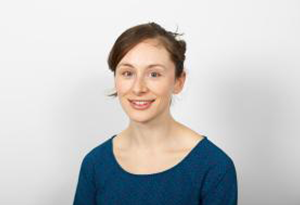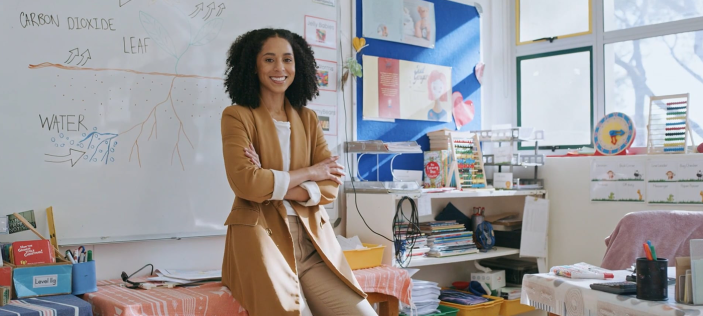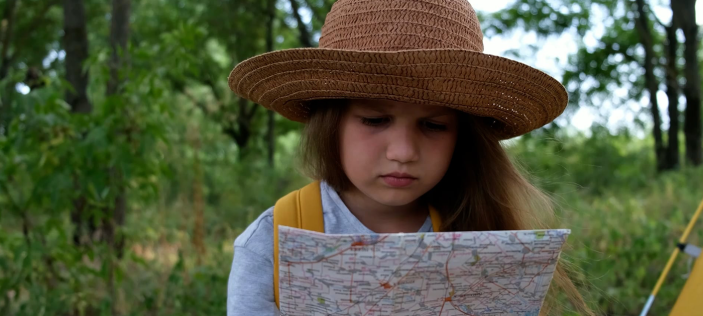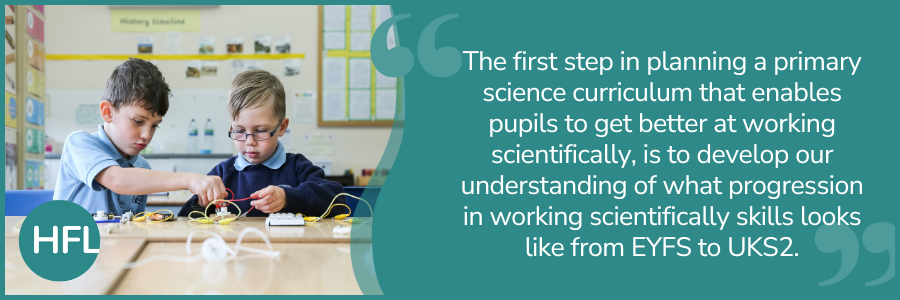
Whilst learning about subject content such as plants, forces, and habitats pupils also need to learn how to work scientifically. Ofsted uses the terms substantive and disciplinary to refer to the subject content knowledge and the knowledge pupils need to develop to get better at working scientifically. In the Ofsted science subject report, it defines these two types of knowledge as:
Substantive knowledge: refers to the established knowledge produced by science, for example, the parts of a flower or the names of planets in our solar system. This is referred to as ‘scientific knowledge’ and ‘conceptual understanding’ in the national curriculum.
Ofsted science subject report: Finding the Optimum (February 2023)
Disciplinary knowledge: refers to what pupils learn about how to establish and refine scientific knowledge, for example by carrying out practical procedures. By identifying and sequencing this knowledge, it is possible to plan in the curriculum for how pupils will get better at working scientifically throughout their time at school.
Ofsted science subject report: Finding the Optimum (February 2023)
Many schools and leaders feel confident with the progression of substantive knowledge within their science curriculum but feel less confident in how working scientifically skills progress through the curriculum. The Ofsted science subject report, Finding the Optimum noted this:
Leaders' plans to develop pupils’ disciplinary knowledge were usually much less developed than their plans to develop pupils’ substantive knowledge. In general, not enough consideration was given to identifying the disciplinary knowledge, including concepts, that are needed to work scientifically. This limited how effectively leaders could plan a curriculum for pupils to get better at working scientifically over time.
Ofsted science subject report: Finding the Optimum (February 2023)
If teachers’ understanding of working scientifically skills (and how they progress through the curriculum) is limited, then they may not be aware of which working scientifically skills to focus on while pupils complete practical work or enquiry. Consequently, they may not be aware of the disciplinary knowledge that needs to be explicitly taught for pupils to work scientifically at an age-appropriate level. Pupils are therefore unlikely to develop the knowledge and understanding to working scientifically.
The first step in planning a primary science curriculum that enables pupils to get better at working scientifically, is to develop our understanding of what progression in working scientifically skills looks like from EYFS to UKS2. Doing this will help teachers identify what to focus on and help answer questions like:
- When should pupils be expected to come up with their own plan for answering a question?
- Should I provide a results table for pupils to record in?
- What should a conclusion in lower KS2 include?
At HFL we have recently updated our ‘progression in working scientifically skills’ document which aims to show how working scientifically skills build through the curriculum. To do this we have used both the bold statements from the statutory requirements in the national curriculum and information from the notes and guidance section. The notes and guidance section is useful as it often gives further detail which helps with considering the small steps in progression that need to be taken along the journey.
For example, when thinking about the strand of ‘planning’ or ‘following an approach’ (shown below) the bold statements alone do not fully help with identifying how pupils go from performing simple tests in KS1 to planning different types of scientific enquiries in UKS2. The statements we have added, using the notes and guidance from the national curriculum and knowledge of what pupils need to know to get to the desired end point, help to identify what teachers need to support pupils to do, as they progress through the curriculum. Considering these small steps should support pupils to get to that end point of planning different types of enquiry to answer questions.
| EYFS | KS2 | LKS2 | UKS2 | |
| Planning or following an approach |
|
|
|
|
To support teachers in making the skills explicit and helping pupils understand the skills they are developing, we have also created working scientifically building blocks (a development on our working scientifically wheels).
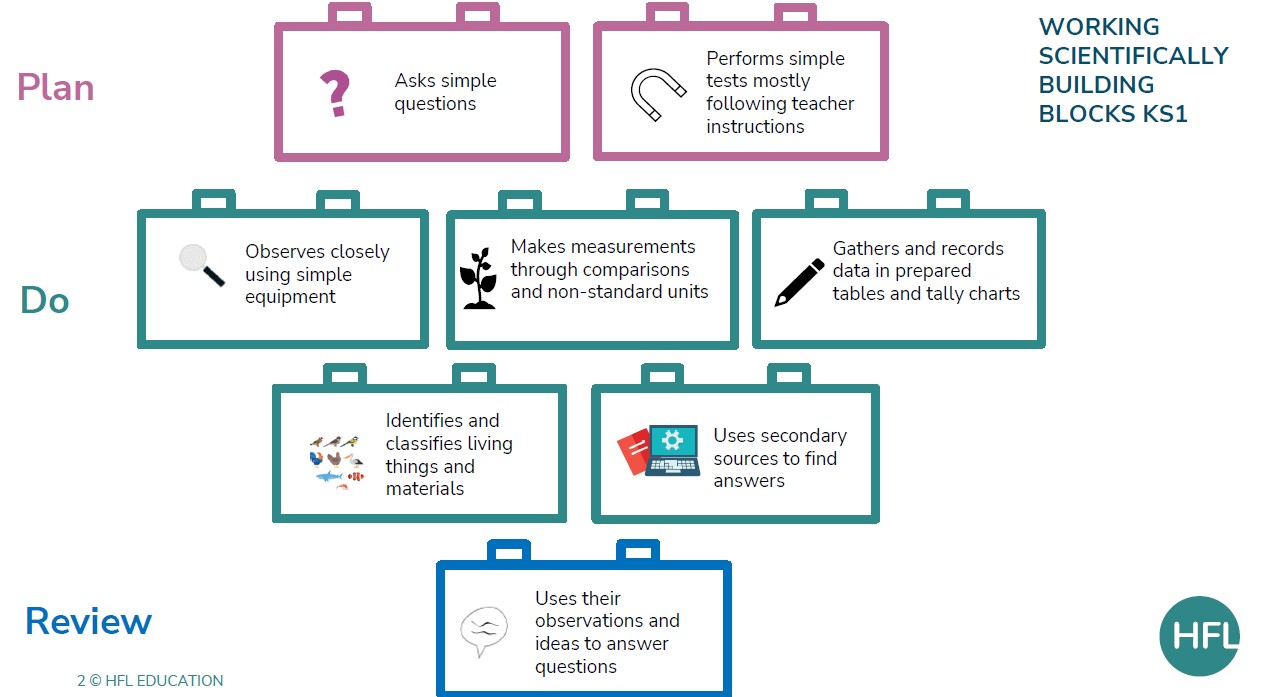
These could be used in several ways to support pupils to understand what it means to work scientifically and develop an awareness of the skills they are developing. One approach could be to use them to record when pupils have demonstrated skills. This could be through self-assessment, when appropriate.
Once understanding of progression in working scientifically skills has been developed, a possible next step is to map the working scientifically skills to the long-term plan, so a plan is in place to make sure there is good coverage of the full range of skills including multiple opportunities to practice them across a range of contexts. This will also remind teachers that having a clear focus is necessary when teaching working scientifically skills, as focusing on a specific skill or a few skills allows for more time to explicitly teach, model and review children’s understanding.
Mapping working scientifically skills is not an easy or quick job and may be a task that is best done collaboratively with teachers and leaders over a period of time. It is important that the most relevant skills are chosen as a focus for each enquiry or practical. For example, ‘evaluating’ would be a good focus for enquiries where it is likely that pupils will be able to easily identify improvements that could be made.
The new HFL progression in working scientifically skills and HFL working scientifically building blocks can be found on Primary PA Plus. If your school subscribes to PA plus, then these documents are free to download when you are logged into the HFL website.
If you are not yet subscribed to PA Plus, then the same documents can be accessed for a small charge on our HFL Education shop.
Want to keep up to date with new resources, guidance and reports? Why not sign up to our mailing list and book a place at our termly subject leader updates. These are recorded so leaders can join through the year and catch up on any sessions they have missed
